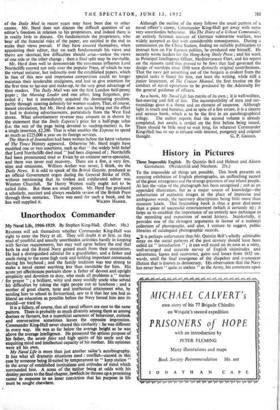Unorthodox Commander
My Naval Life, 1906-1929. By Stephen King-Hall. (Faber. 18s.) READERS will ask themselves whether Commander King-Hall was right to enter the Navy at all. They will doubt it at first, as they read of youthful and usually unorthodox activities hardly in keeping with Service requirements, but may well agree before the end that both he and the Royal Navy gained much from their association. He had a distinguished admiral for a grandfather, and a father and uncle rising to the same high rank and holding important commands during his boyhood ; and the family tradition was too strong to make a naval career anything less than inevitable for him. His acute yet affectionate portraits show a father of devout and upright simplicity and devotion to duty, who made all problems a' matter for prayer " ; a brilliant, witty and more worldly uncle who solved his difficulties by taking the right people out to luncheon ; and a mother of great charm, taste and intellectual attainment who, by sending him to school in Switzerland, saw to it that her son had as liberal an education as possible before the Navy forced him into its mould—or tried to.
It is a fallacy, of course, that all naval officers are cast to the same pattern. There is probably as much diversity among them as among doctors or farmers, but a superficial sameness of behaviour, outlook and conversation sometimes leaves the opposite impression. Commander King-Hall never shared this similarity : he was different in every way. He was as far below the average height as he was above the average intelligence. He possessed the serious purpose of his father, the savoir faire and high spirits of his uncle and the enquiring mind and intellectual capacity of his mother. His opinions were all his own.
My Naval Life is more than just another sailor's autobiography. It has what all dramatic situations need : conflict—caused in this case by someone being ill-suited by temperament to "keep station" in the array of established institutions and attitudes of mind which surrounded him. A sense of the author being at odds with his destiny persists to the final chapter, in.Which he throws up a promising career in response to an inner conviction that his purpose in life must be sought elsewhere. Although the outline of the story follows the usual pattern of a naval officer's career, Commander King-Hall got away with some very unorthodox behaviour. His The Diary of a U-boat Commander, an entirely fictional account of German submarine warfare, was widely accepted as fact with considerable consequences. During a commission on the China Station, finding no suitable publication to instruct him on Far Eastern politics, he produced one himself. He secretly wrote leaders for the Hong-Kong Daily Press ; and his work as Principal Intelligence Officer, Mediterranean Fleet, and his report on the reasons (and they proved to be few) that had governed the design of warships since 1880 were distinctly original contributions. That the navy got something out of the bargain is evident from the special tasks it found for him, not least the writing, while still a junior lieutenant, of The Cruiser Manual, the first treatise on the conduct of naval operations to be produced by the Admiralty for the general guidance of officers.
As a book, My Naval Life has merits of its own ; it is well-written, fast-moving and full of fun. The incompatibility of man and sur- roundings gives it a theme and an element of suspense. Although light in touch and humour, and in spite of a few errors, it is a sincere and serious book, which is to be the first in an autobiographical trilogy. The author reports that the second volume is already completed, but awaits a verdict on the first before being issued. There should be little need to wait long, for whatever Commander King-Hall has to say is infused with interest, pungency and original


































 Previous page
Previous page